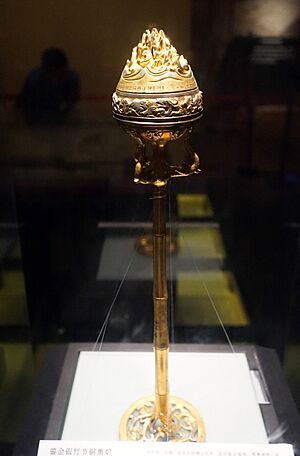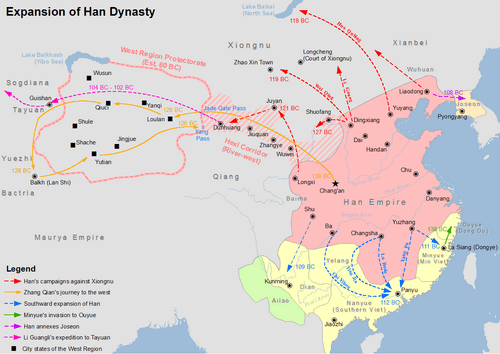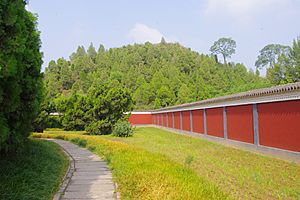Wei Qing facts for kids
Quick facts for kids
Wei Qing
衛青 |
|
|---|---|
| Born |
Zheng Qing (鄭青)
Unknown Linfen, Shanxi
|
| Died | 106 BC Xi'an, Shaanxi
|
| Other names |
|
| Occupation | Military general, politician |
| Spouse(s) | Grand Princess Yangxin |
| Children |
|
| Parents |
|
Wei Qing (died 106 BC), also known as Zhongqing, was a famous Chinese military general and leader during the Western Han dynasty. He was celebrated for his successful battles against the Xiongnu people. Wei Qing started from very humble beginnings and rose to a powerful position. He was related to Emperor Wu of Han because his half-sister, Wei Zifu, became the Empress. Later, Wei Qing also married Emperor Wu's older sister, Eldest Princess Yangxin. He was also the uncle of Huo Qubing, another brave general who fought against the Xiongnu.
Contents
Early Life and Humble Beginnings
Wei Qing was born into a poor family. His father, Zheng Ji, worked for the Marquess of Pingyang, Cao Shou, and his wife, Princess Pingyang. Zheng Ji and a servant named Wei Ao had a son, Zheng Qing.
Young Zheng Qing first lived with his father's family. However, they did not treat him well, and he had to work as a sheepherder. When he was a teenager, Zheng Qing went back to live with his mother. He then worked as a stableboy at the Pingyang estate. He decided to use his mother's family name, "Wei," instead of his father's.
Rising Through the Ranks
A story says that Wei Qing once met a fortune-teller. The fortune-teller predicted that Wei Qing would become a noble and a marquis. Wei Qing thought this was a joke. He said he would be lucky just to avoid punishment, given his humble life.
Around 139 BC, Wei Qing's sister, Wei Zifu, became a singer for Emperor Wu of Han. Wei Qing went with her and became a horseman in the Emperor's Royal Guards. As his sister gained the Emperor's favor, Wei Qing faced danger.
The powerful Grand Princess Guantao, Liu Piao, was angry that Wei Zifu was becoming so important. She tried to harm Wei Qing. Luckily, his friends, led by Gongsun Ao, rescued him. Because of this event, Emperor Wu gave Wei Qing important roles. He became Chief of Jianzhang Camp, Chief of Staff, and Chief Councillor. This made Wei Qing one of Emperor Wu's closest helpers. The Emperor also officially made Wei Zifu a consort and rewarded her family. This was the start of the Wei family's rise to power.
Emperor Wu saw many good qualities in Wei Qing. He was excellent at horsemanship and archery. He was brave and had great tactical skills. He was also a strong leader. Over the next few years, Wei Qing became Emperor Wu's most trusted general.
Great Military Victories
In 129 BC, the Xiongnu attacked a Han territory. Emperor Wu sent Wei Qing and three other generals to fight them. Wei Qing, who was the least experienced, led a successful long-distance attack on a Xiongnu holy site. He killed over 700 Xiongnu soldiers. This was the first major Han victory against the Xiongnu. As a reward, Wei Qing was promoted and given the title of acting Marquess of Guannei.
In 128 BC, Empress Wei Zifu gave birth to Emperor Wu's first son. Later that year, Wei Qing led 30,000 cavalry soldiers. He killed thousands of Xiongnu soldiers in another successful campaign.
In 127 BC, Wei Qing led 40,000 cavalry. He surprised the Xiongnu forces, killing over 2,300 and capturing more than 3,000 soldiers. He also captured over a million cattle. This battle was so quick that the Han forces returned with almost no losses. For this victory, Wei Qing was promoted again to Marquess of Changping. The Han forces took back important land from the Xiongnu. This area became a key stronghold for future battles.
In 124 BC, Wei Qing led the Han to their biggest victory against the Xiongnu yet. He launched a surprise night attack with 30,000 cavalrymen. He completely surrounded the Xiongnu's main camp. The Xiongnu leader had to run away, leaving behind about 15,000 captives and millions of cattle. For this victory, Wei Qing was made "Grand General" of all armed forces. His three young sons were also offered noble titles, but Wei Qing refused them.
In 123 BC, Wei Qing led another campaign. He killed or captured over 10,000 Xiongnu soldiers. However, some of his troops, led by generals Su Jian and Zhao Xin, were defeated by a larger Xiongnu force. Zhao Xin, who was a surrendered Xiongnu prince, switched sides during the battle. Su Jian escaped after losing all his men. Wei Qing showed kindness to Su Jian and did not punish him. In this campaign, Wei Qing's nephew, Huo Qubing, also showed great bravery.
The Battle of Mobei
In 119 BC, Emperor Wu decided to launch a huge expedition across the Gobi Desert to strike at the Xiongnu's main base. This was known as the Battle of Mobei (meaning "campaign of the desert's north"). Wei Qing and Huo Qubing led the two main armies. Each had 50,000 cavalry and 100,000 foot soldiers.
Wei Qing's army included four other generals, including the elderly but eager Li Guang. Emperor Wu secretly told Wei Qing not to give Li Guang a crucial mission because of his past bad luck. Wei Qing sent Li Guang's forces on a difficult flanking route through a barren area.
After crossing the desert, Wei Qing's army unexpectedly met the main Xiongnu forces. Even though they were outnumbered and tired, Wei Qing used a clever defense. He arranged heavy chariots in a circle to protect his archers. This defense was very effective against the Xiongnu cavalry. The battle lasted until dusk, when a sandstorm hit. Wei Qing used the poor visibility to launch surprise attacks from both sides. The Xiongnu, already tired, were scared by the sudden attacks and ran away.
This decisive attack broke the Xiongnu's lines. The Han army killed over 10,000 Xiongnu soldiers and chased them far north. They destroyed a Xiongnu stronghold before returning in triumph. The Xiongnu leader barely escaped and was out of contact with his tribe for days. This was a very important victory for the Han empire. The Xiongnu were greatly weakened and could not raid the south for the next ten years.
The Li Gan Incident
During the Battle of Mobei, Li Guang's division got lost in the desert. They failed to reach the battlefield on time. Both Li Guang and another general were called to explain their failure. Feeling ashamed and frustrated, Li Guang died. Many people, including the historian Sima Qian, blamed Wei Qing for Li Guang's death.
Li Guang's youngest son, Li Gan, was serving under Huo Qubing. He went to Wei Qing's home and attacked him. Wei Qing chose to forgive him. However, Huo Qubing was very angry that his uncle had been disrespected. He later shot Li Gan during a hunting trip, killing him.
Later Years and Passing
After the 119 BC campaign, Wei Qing did not fight many more battles. He mostly stayed in the capital, Chang'an. He advised Emperor Wu on military and political matters. He also helped his nephew, Liu Ju, who was the Crown Prince, when Emperor Wu was away.
Despite his great power, Wei Qing remained humble. Other officials flattered him, but Ji An treated him as an equal. Wei Qing respected Ji An's honesty and often asked for his advice. He never hired scholars to praise him and tried to keep a low profile.
Wei Qing died in 106 BC. He was buried in a large tomb shaped like a mountain. His tomb was connected to that of his nephew, Huo Qubing, who had died earlier, and the future tomb of Emperor Wu of Han. Wei Qing did not live to see the sad events that would later affect his family.
Family Connections
- Mother
- Madam Wei (衛媪)
- Father
- Zheng Ji (鄭季)
- Siblings
- Wei Zhangjun (衛長君), eldest half-brother
- Wei Junru (衛君孺), eldest half-sister
- Wei Shaoer (衛少兒), mother of Huo Qubing, older half-sister
- Wei Zifu (衛子夫), mother of Liu Ju, youngest older half-sister, Empress to Emperor Wu of Han
- Wei Bu (衛步), younger half-brother
- Wei Guang (衛廣), younger half-brother
- Wife
- Princess Pingyang (平陽公主), eldest sister of Emperor Wu
- Children
- Wei Kang (衛伉), Marquess of Changping
- Wei Buyi (衛不疑), Marquess of Yin'an
- Wei Deng (衛登), Marquess of Fagan
- Nephews
- Gongsun Jingsheng (公孫敬聲), son of Wei Junru
- Huo Qubing (霍去病), son of Wei Shao'er
- Liu Ju (劉據), son of Wei Zifu, eldest son and heir to Emperor Wu
- Nieces
- Grand Princess Wei (衛長公主)
- Princess Zhuyi (諸邑公主)
- Princess Yangshi (陽石公主)
 | William L. Dawson |
 | W. E. B. Du Bois |
 | Harry Belafonte |




